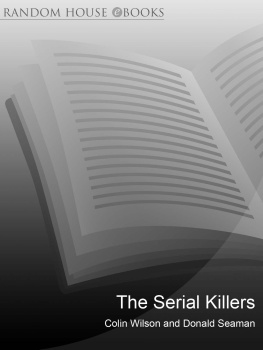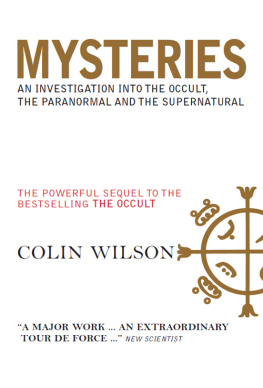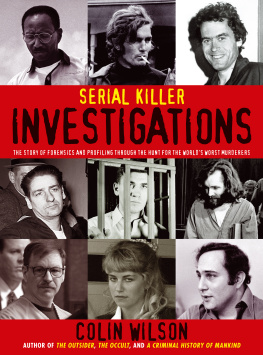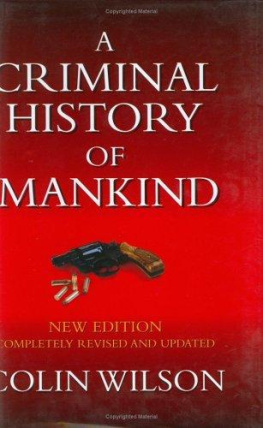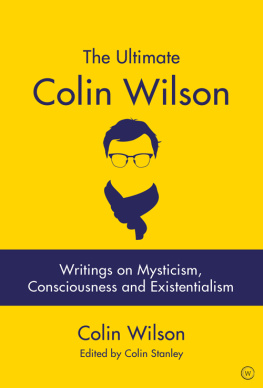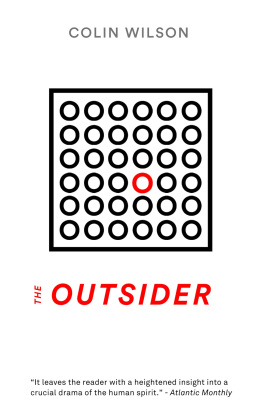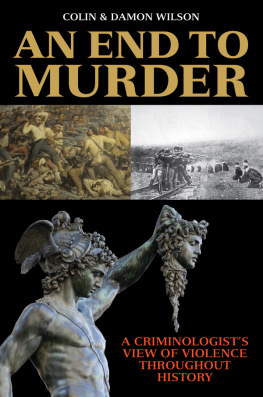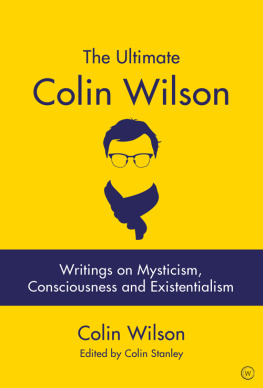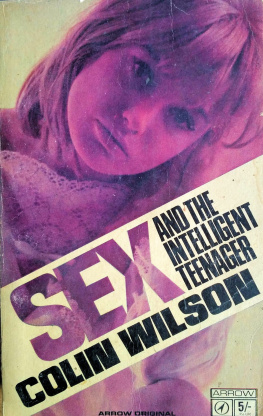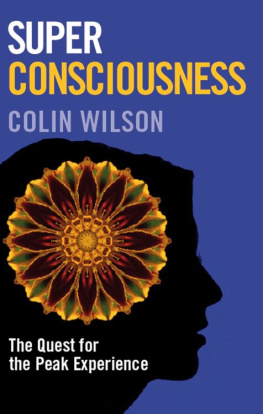Colin Wilson - Ritual in the Dark
Here you can read online Colin Wilson - Ritual in the Dark full text of the book (entire story) in english for free. Download pdf and epub, get meaning, cover and reviews about this ebook. genre: Detective and thriller. Description of the work, (preface) as well as reviews are available. Best literature library LitArk.com created for fans of good reading and offers a wide selection of genres:
Romance novel
Science fiction
Adventure
Detective
Science
History
Home and family
Prose
Art
Politics
Computer
Non-fiction
Religion
Business
Children
Humor
Choose a favorite category and find really read worthwhile books. Enjoy immersion in the world of imagination, feel the emotions of the characters or learn something new for yourself, make an fascinating discovery.

- Book:Ritual in the Dark
- Author:
- Genre:
- Rating:5 / 5
- Favourites:Add to favourites
- Your mark:
- 100
- 1
- 2
- 3
- 4
- 5
Ritual in the Dark: summary, description and annotation
We offer to read an annotation, description, summary or preface (depends on what the author of the book "Ritual in the Dark" wrote himself). If you haven't found the necessary information about the book — write in the comments, we will try to find it.
Ritual in the Dark — read online for free the complete book (whole text) full work
Below is the text of the book, divided by pages. System saving the place of the last page read, allows you to conveniently read the book "Ritual in the Dark" online for free, without having to search again every time where you left off. Put a bookmark, and you can go to the page where you finished reading at any time.
Font size:
Interval:
Bookmark:
Colin Wilson
Ritual in the Dark
PART ONE
CHAPTER ONE
He came out of the Underground at Hyde Park Corner with his head lowered, ignoring the people who pressed around him and leaving it to them to steer out of his way. He disliked the crowds. They affronted him. If he allowed himself to notice them, he found himself thinking: Too many people in this bloody city; we need a massacre to thin their numbers. When he caught himself thinking this, he felt sick. He had no desire to kill anyone, but the hatred of the crowd was uncontrollable. For the same reason, he avoided looking at the advertisements that line the escalators of London tubes; too many dislikes were triggered off by the most casual glimpse. The half-clothed forms that advertised women's corsets and stockings brought a burning sensation to his throat, an instantaneous shock, like throwing a match against a petrol-soaked rag.
A thin brown drizzle fell steadily; the passing traffic sprayed muddy water. He buttoned the raincoat and turned up its collar, then opened the woman's umbrella he carried suspended by its loop from his wrist. The crowd thinned as he crossed Grosvenor Crescent; he walked more slowly, enjoying the noise of the rain on the umbrella.
Outside the gilded wrought-iron gates he stopped and fumbled for his money. The doorway of the house was hidden by a striped tent surmounted by a Russian onion dome; on either side of this stood statues of two enormous Negroes, leaning on the marble archway that formed the entrance to the tent. He lowered the umbrella, shaking it to dislodge the raindrops. Behind the Negroes, the walls of the house looked black and desolate.
The entrance hall smelt of damp clothes. A queue of half a dozen people was waiting at the boxoffice. The inside walls of the tent were covered with red and gold striped paper.
There was some delay at the boxoffice. A middle-aged man was protesting with a foreign voice:
Nevertheless, I am a student at the London School of Economics. It is merely that I have forgotten my card. I have a British Museum Reading Room card if that is any good
Sorme produced a book from the side pocket of his jacket, and began to read. The queue moved forward again.
He became aware that the man in front of him was looking down at his book, trying to read its title from the page heading. He looked up, and met a pair of narrow, brown eyes, that turned away immediately with embarrassment. In that moment, he had registered a thin, long-jawed face that in some way struck him as oddly familiar. It was ugly, in a pleasant way, covered with small indentations that could have been pock-marks. A moment later, the man bought his ticket, and Sorme had a chance to observe him more fully. The examination brought no recognition. He was taller than Sorme, although Sorme was slightly over six feet tall. His dark grey suit was well cut. The thin face had high cheekbones, and eyes that slanted. It was so familiar that Sorme stared a moment too long, and suddenly found himself looking into the slanting brown eyes again.
They smiled at him briefly as the man turned away, and Sorme was suddenly certain that he had never seen him before. The ticket-seller was asking: Student?
Yes.
One and sixpence please. Catalogue?
The stairway that led out of the tent curved round the canvas walls, and exposed the rusty scaffolding that supported it. He walked quickly, disliking the unpleasant memories aroused by the scaffolding. The stairs led to a doorway that had been constructed from a first-floor window, and formed the entrance to the exhibition. The first room immediately dissipated the mood of dislike. It had been designed to look like a Paris street, with iron railings, and a view of the Seine between the houses. Under the leaves of an overhanging tree, a huge poster displayed the words: THEATRE DES CHAMPS ELYSEES. BALLETS RUSSES. The enormous drawing of Nijinsky as the Spectre of the Rose was signed by Cocteau.
The place was warm; there was no one else in the room, and he lost the feeling of tension that the rain and the crowds had induced. There was a sound of music coming from a loudspeaker in another room. He slipped the book back into the jacket pocket, plunged his hands deep into his raincoat pockets, and gave himself up completely to the sense of nostalgia evoked by the room. He stood there for a few moments unmoving, until he heard footsteps and voices on the stairway, then walked quickly past the poster of Pavlova that faced Nijinsky, and mounted the narrow wooden stair to the second floor.
The music was louder there. He recognised the final dance from The Firebird, the soft, drawn-out horn call. It sent a warm shock of pleasure through the muscles of his back and shoulders, and stirred the surface of his scalp. People were already mounting the stairs behind him. He hurried on into the well-lit room. There was only one other person in it: the man who had stood in front of him in the queue. The voices and footsteps that came from the stairway drove him forward into the next room. A violent hatred arose in him of the talking people who talked away emotions into words. A drawling, cultured voice was saying:
and we nearly got a snap of him. He was there on the beach, just changing into a pair of bathing trunks. Lettie grabbed her camera, but she wasn't quick enough he got them on. Should have been worth something a shot of Picasso in the raw
The music had stopped. The voice faltered, embarrassed at the silence. Abruptly the music began again, a violent, discordant clamour that exploded in the small room and drowned all other sounds. He recognised Prokoviev's Scythian Suite, and smiled. The din was shaking the glass case in the middle of the room; it isolated him as effectively as silence. He examined with satisfaction a design by Benois.
The rooms were not crowded. He worked through them slowly, returning to the first room when the people behind him an army officer with two girls caught up with him.
An hour later, the loudspeakers were relaying The Three-cornered Hat, and he was again on the first floor, in the portrait gallery. The heat was making him sleepy.
There was a curious scent hanging in the air which he half-suspected of possessing an anaesthetic quality. As he paused in front of a portrait of Stravinsky, he noticed the bust.
It stood on a cube of marble, directly below an oil painting of a ballerina in a white dress.
The inscription underneath said: Nijinsky, by Una Troubridge. He had remembered then of whom the stranger reminded him. It was Nijinsky.
Somewhere, a long time before, he had seen a photograph that caught the same expression, and the thin, faun-like face had impressed itself on his mind. As he stared at it now, the resemblance was no longer so obvious. Automatically he looked around to see if the man was anywhere near. He was not. Idly, he wondered whether he might be any relation of Nijinsky, his son perhaps. He could remember no son; only a daughter.
Anyway, the bust was not really like him. It was not really like Nijinsky either; it had been idealised.
The man was in the Chirico room at the top of the stairs; he stood, leaning on an umbrella, examining one of the designs. Sorme crossed the room and stood close to him, where he could watch his face out of the corner of his eye. The resemblance was certainly there; it had not been imagination. By turning his head a little more, as if examining the design to his left, he could examine the face in profile.
Without looking at him, the stranger said abruptly:
He should have done more ballet designs.
For a moment, Sorme supposed he was addressing somebody on his left-hand side, then realised, equally quickly, that they were alone in the room. The man had not turned his face from the design he was examining. Sorme said: I beg your pardon?
Font size:
Interval:
Bookmark:
Similar books «Ritual in the Dark»
Look at similar books to Ritual in the Dark. We have selected literature similar in name and meaning in the hope of providing readers with more options to find new, interesting, not yet read works.
Discussion, reviews of the book Ritual in the Dark and just readers' own opinions. Leave your comments, write what you think about the work, its meaning or the main characters. Specify what exactly you liked and what you didn't like, and why you think so.


